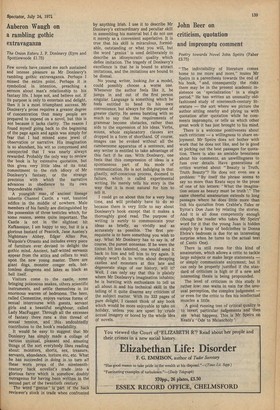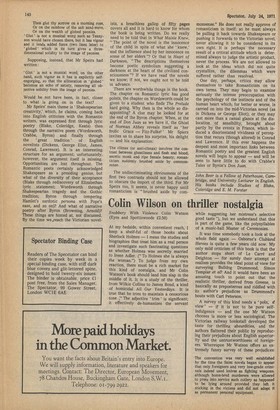John Beer on criticism, quotation and impromptu comment
Poetry towards Novel John Speirs (Faber £3.75) "The indivisibility of literature comes home to me more and more," muses Mr Speirs in a parenthesis towards the end of his book, "and, consequently the risks there may be in the present academic in sistence on ' specialization ' in a single period." He has written an unusually oldfashioned study of nineteenth-century lit erature — the sort where we picture the author sitting nearby and plying us with quotation after quotation while he com ments impromptu, or tells us which other great work it has just brought to his mind. There is a welcome positiveness about such criticism — a willingness to share en joyment. Mr Speirs does not bother with work that he does not like, and he is good at picking out the best passages for quota tion. There is also an amiable breeziness about his comments, an unwillingness to fuss over details. Have generations of critics worried about "Beauty is Truth, Truth Beauty"? He does not even see a problem: "By itself the phrase seems to say no more than Keats says in the prose of one of his letters: 'What the imagination seizes as beauty must be truth '." The same cheerful amateurism extends to long passages where he does little more than link his quotation from Crabbe's Tales or Byron's Don Juan by relating the stories. And it is all done competently enough (though the reader who takes Mr Speirs' word for it that the young Juan is hidden simply by a heap of bedclothes in Donna Elvira's bedroom is due for an interesting surprise when he turns to the actual text of Canto One).
There is still room for this kind of amateurism, which allows a critic to tackle large subjects or make large statements — or simply communicate enjoyment; but it can only be properly justified if the standard of criticism is high or if a new and interesting thesis is being propounded.
The level of criticism in this study Is rather low: one waits in vain for the unu sual perception, the complex judgement — or even for the critic to flex his intellectual muscles a little.
A good running test of critical quality Is to invert particular judkements and then see what happens. This is Mr Speirs on Keats's 'Ode to Melancholy ': Then glut thy sorrow on a morning rose, Or on the rainbow of the salt sand-wave, Or on the wealth of globed peonies. ' Glut ' is not a musical word such as Tennyson would have chosen there, but it has vigour and it lends added force (two lines later) to globed ' which in its turn gives a threedimensional solidity to the image of peonies.
Supposing, instead, that Mr Speirs had written : 'Glut' is not a musical word; on the other hand, such vigour as it has is explicitly selfengorging, so that the alliteration in 'globed' becomes an echo of satiety, removing all objective solidity from the image of peonies.
Would he not have been, in fact, closer to what is going on •in the text?
Mr Speirs' main theme is 'Shakespearian creativity,' which, he claims, coming back into English criticism with the Romantic writers, was expressed first through lyric poetry (Blake, Coleridge, Keats) then through the narrative poem (Wordsworth, Crabbe, Byron) and finally through the 'great tradition' of English novelists (Dickens, George Eliot, James, Conrad, Lawrence). It is an interesting structure for an argument; unfortunately, however, the argument itself is missing. Opportunities are lost throughout. The Romantic poets certainly acknowledged Shakespeare as a presiding genius, but what of the diversity of their acceptance (Blake through rediscovery of Elizabethan lyric statement; Wordsworth through Shakespearian tragedy and the Gothic tradition; Byron through tempering Hamlet's sardonic persona with Pope's ease, and so on)? And what of narrative poetry after Byron (Browning, Arnold)? These things are hinted at, not discussed. By the time we.reach the Victorian novel ists, a breathless gallop of fifty pages covers all and it is hard to know for whom the book is being written. Do we really need to be told that in What Maisie Knew, "The point of the novel is the innocence of the child in spite of what she 'knew,' 'and the influence shed by her innocence on some of her elders "? Or that in Heart of Darkness, "The descriptions themselves become poetic symbolism suggesting a darkness at the heart of the civilized consciousness "? If we have read the novels we know; if not, we ought not to be told in advance.
There are worthwhile things in the book. The chapter on Romantic lyric has good points, the chapter on Wordsworth could be given to a student who finds The Prelude hard going. Why then is the whole so disappointing? A clue may be looked for at the end of the Byron chapter. When, at the end of Don Juan as we have it, the Ghost of Norman Abbey reveals itself as ' her frolic Grace — Fitz-Fulke! ' Mr Spiers invites us to share his surprise, his delight — and his explanation: The climax (or anti-climax) involves the contrast between ghostliness and flesh and blood, ascetic monk and ripe female beauty, romanticism suddenly brushed aside by commonsense.
The undiscriminating obviousness of the first two contrasts should not be allowed to obscure the import of the third. For Mr Speirs too, it seems, is never happy until romanticism is "brushed aside by corn monsense." He does not really approve of romanticism in itself: so he must always be pulling it back towards Shakespeare or pushing it forwards to the Victorian novel, never allowing it to be considered in its own right. It is perhaps the necessary result of a critical attitude which is determined always to judge the artistic product, never the process. We are not allowed to look at the ideas which did not quite crystallize, the dilemmas which were suffered rather than resolved.
One day, perhaps, critics may allow themselves to take Romanticism on its own terms. They may begin to examine seriously the intense preoccupation with the psychology of the instincts and of the human heart which; for better or worse, is carried on into the mid-Victorian novel (as in Dickens or George Eliot); or they may cast more than a casual glance at the dislocation of sensibility, brought about partly by the events in France, which induced a disorientated vividness of perception that recurs (though altered) in Conrad and Lawrence. If this ever happens the deepest and most important links between Romantic poetry and the greatest English novels will begin to appear — and will be seen to have little to do with Crabbe's Tales or Byron's Don Juan.
John Beer is a Fellow of Peterhouse, Cambridge, and University Lecturer in English. His books include Studies of Blake, Coleridge and E. M. Forster











































 Previous page
Previous page